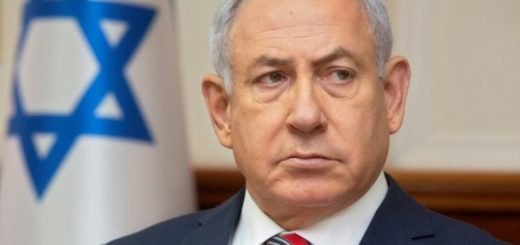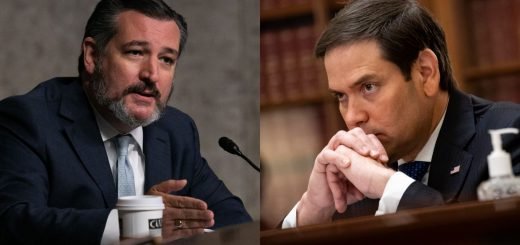Syria: One of very first Theaters of Cold War 2.0?
James Mattis, the US defence secretary, has said Washington is still looking for evidence on who carried out Saturday’s chemical weapons attack in Damascus and said his main concern about a military response was how to stop it “escalating out of control”.
However, the French president, Emmanuel Macron, said on Thursday that his government had “proof” that the government of Bashar al-Assad was responsible for the attack, which is reported to have killed about 50 people and affected hundreds more.
NBC and CNN quoted US officials as saying that blood and urine samples from the victims of Saturday’s attack showed traces of chlorine and a nerve agent and that US intelligence had other evidence pointing to the regime’s culpability, which would be presented to the president.
But Mattis’s cautious tone on Thursday echoed a morning tweet by Donald Trump that appeared to walk back his threat of imminent action 24 hours earlier.
On Wednesday, the president tweeted that US missiles “will be coming” and told Russia, which has forces in Syria, to “get ready”. But the next morning, Trump tweeted that he “never said when an attack on Syria would take place”. An attack, the president said, “ could be very soon or not so soon at all!”
Never said when an attack on Syria would take place. Could be very soon or not so soon at all! In any event, the United States, under my Administration, has done a great job of ridding the region of ISIS. Where is our “Thank you America?”
— Donald J. Trump (@realDonaldTrump) April 12, 2018
In testimony to the House armed services committee, Mattis said that tweet meant that Trump “has not made a decision”. He pointed out that Trump would meet his top national security advisers at the White House on Thursday afternoon where he would be presented with a full range of options.
Analysts said the more measured tone suggested that the US and allies were prepared to take longer to ready a more comprehensive, multi-phase attack than the US missile salvo launched last April after a previous poison gas attack, while building pressure on Russia to rein in the regime’s worst atrocities and accept Assad’s departure as part of a Syrian political settlement.
At the UN, the Russian envoy, Vassily Nebenzia, said Russia’s “immediate priority is to avert the danger of war”.
Asked if he was referring to a war between the United States and Russia, Nebenzia told reporters: “We cannot exclude any possibilities unfortunately because we saw messages that are coming from Washington. They were very bellicose.”
Nebenzia added: “They know we are there. I wish there was dialect though the proper channels on this to avert any dangerous developments. The danger of escalation is higher than simply Syria because our military are there. So the situation is very dangerous.”
In Washington, Mattis voiced similar concerns.
“My strategic concern is how do we keep this from escalating out of control if you get my drift,” he told members of Congress. In another marked contrast with Trump’s remarks on Saturday’s poison gas attack in Douma, Mattis said he believed chemical weapons had been used, but “we are looking for evidence” on who was responsible. Trump has blamed Assad and Russia for backing him.
Macron, who has repeatedly insisted that proven use of chemical weapons in Syria was a “red line” for France, said on Thursday that his government would decide its response “in due course”.
“We have the proof that last week chemical weapons were used – at least chlorine – and that they were used by the Assad regime,” Macron told a TV interviewer.
The French president said one of his aims in Syria was to “remove the regime’s chemical attack capabilities” once all information had been checked. But Macron repeated that he wanted to also avoid “an escalation”.

He said: “France will in no way allow an escalation or anything that would harm regional stability, but we cannot allow regimes that believe they can act with impunity to violate international law in the worst possible way.”
In London, Theresa May convened a cabinet meeting on Thursday afternoon that was expected to sign off on UK participation in US-led air strikes.
Inspectors from the Organisation for the Prohibition of Chemical Weapons (OPCW) were due to arrive in Damascus on Thursday, but they are not due to visit the site of the attack – until Saturday.
Mattis said repeatedly he believed the use of chemical weapons was “inexcusable” and required a forceful response.
Asked about a legal justification for punitive strikes, he pointed to the presence of US troops in Syria, who could be vulnerable. He said: “We don’t have to wait until a chemical attack, when [chemical weapons] are be used in the same theatre we are operating in.”
The Kremlin said on Thursday that Russia and the US were currently using a “deconfliction” telephone line for Syria.
Asked about a legal justification for punitive strikes, he pointed to the presence of US troops in Syria, who could be vulnerable. He said: “We don’t have to wait until a chemical attack, when [chemical weapons] are be used in the same theatre we are operating in.”
The Kremlin said on Thursday that Russia and the US were currently using a “deconfliction” telephone line for Syria.
Mike Pompeo, the CIA director and Trump’s pick for secretary of state, appeared to affirm at his confirmation hearing reports that about 200 Russian mercenaries were killed in a February clash with US-led forces in Syria. The deconfliction line between the US and Russian militaries was used during that incident.
Source: The Guardian Md. Irfan Ansari The Kootneeti Team - Middle East Monitor


















